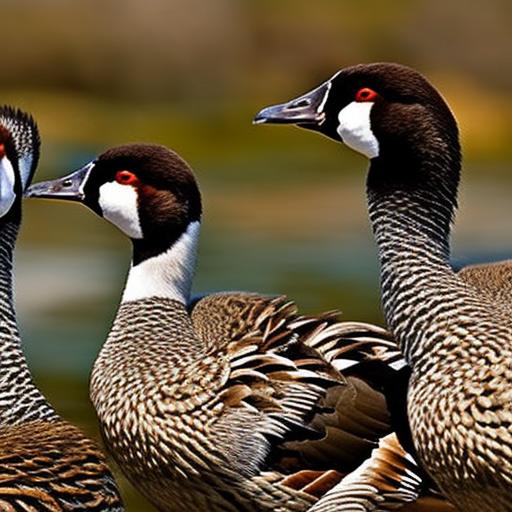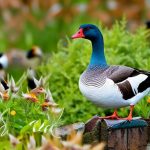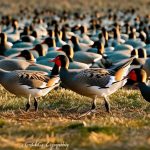Geese have a long history of being domesticated animals, dating back thousands of years. They were originally domesticated for their meat, feathers, and eggs, but over time, they have also become popular as pets. Geese are known for their intelligence, loyalty, and protective nature, making them great companions for those looking for a unique and engaging pet.
Geese make great pets for a variety of reasons. They are highly social animals and form strong bonds with their owners. They are also known to be excellent watchdogs, as they are naturally protective and will alert you to any potential danger. Additionally, geese are low-maintenance pets that require minimal grooming and can adapt well to different climates.
Key Takeaways
- Keeping geese as pets can be a rewarding experience for those who are willing to put in the effort.
- Benefits of raising geese include their ability to act as natural pest control and their production of eggs and meat.
- Understanding the needs and behaviors of geese is crucial for their well-being and your own safety.
- Choosing the right breed of geese for your home depends on factors such as climate and intended use.
- Setting up a safe and comfortable living space for geese involves providing shelter, water, and appropriate fencing.
Benefits and Drawbacks of Raising Geese
There are several benefits to raising geese as pets. Firstly, geese are excellent egg layers and can provide you with a steady supply of fresh eggs. Their eggs are larger than chicken eggs and have a rich flavor. Secondly, geese can also be raised for meat. Their meat is lean and flavorful, making it a popular choice among many culinary enthusiasts.
Another benefit of keeping geese is their ability to control pests. Geese are natural grazers and will happily eat grass, weeds, and insects in your yard. This can help keep your lawn tidy and reduce the need for chemical pesticides. Lastly, geese make great companions. They are intelligent animals that can form strong bonds with their owners. They enjoy spending time with their human companions and can provide hours of entertainment with their playful antics.
However, there are also some drawbacks to consider when raising geese as pets. One of the main drawbacks is the noise they can produce. Geese are known for their loud honking sounds, especially during mating season or when they feel threatened. This can be disruptive to neighbors or those living in close proximity. Additionally, geese can be messy animals. They have a high water intake and produce a large amount of droppings, which can require regular cleaning and maintenance.
Another potential drawback is the aggression that geese can display. Geese are naturally protective animals and will defend their territory and flock. This can lead to aggressive behavior towards strangers or other animals. It is important to properly socialize and train your geese to minimize any potential aggression.
Understanding the Needs and Behaviors of Geese
To provide the best care for your geese, it is important to understand their needs and behaviors. Geese are highly social animals that form strong bonds with their flock members. They have a hierarchical social structure, with one dominant male and female pair leading the group. Understanding this social behavior can help you create a harmonious environment for your geese.
Geese also have natural instincts and behaviors that should be taken into consideration when keeping them as pets. They are grazers by nature and require access to fresh grass or pasture for grazing. They also have a strong instinct to swim, so providing them with access to a pond or pool is important for their overall well-being.
Communication is an important aspect of goose behavior. Geese use a variety of vocalizations to communicate with each other and with their owners. Honking is the most common vocalization, which can signify different emotions such as warning, excitement, or distress. Understanding these vocalizations can help you better understand your geese’s needs and emotions.
Choosing the Right Breed of Geese for Your Home
When choosing a breed of geese for your home, there are several factors to consider. Popular breeds for pets include Toulouse, Embden, and Chinese geese. These breeds are known for their friendly and docile nature, making them great companions for families.
Climate and space considerations are also important when choosing a breed of geese. Some breeds are better suited for colder climates, while others are more tolerant of heat. It is important to choose a breed that can thrive in your specific climate to ensure their health and well-being.
Personal preferences and goals should also be taken into account when choosing a breed. Some people may prefer a specific breed for its appearance or size, while others may have specific goals such as egg production or meat quality. Researching different breeds and their characteristics can help you make an informed decision.
Setting Up a Safe and Comfortable Living Space for Geese
Creating a safe and comfortable living space for your geese is essential for their well-being. Geese require a sheltered area to protect them from the elements, predators, and provide them with a sense of security. A simple shed or coop with adequate ventilation and protection from drafts is sufficient for most geese.
Outdoor space is also important for geese to roam and graze. Fencing is necessary to keep them contained and protect them from predators. The fence should be at least three feet high and buried several inches into the ground to prevent digging or climbing out.
Nesting and bedding materials should also be provided for your geese. Geese prefer to nest on the ground, so providing a soft bedding material such as straw or hay can create a comfortable nesting area. Regular cleaning of the nesting area is important to maintain hygiene and prevent the spread of diseases.
Feeding and Watering Geese: What You Need to Know

Proper nutrition is essential for the health and well-being of your geese. Geese are grazers by nature and require access to fresh grass or pasture for grazing. They also require a balanced diet that includes grains, vegetables, and protein sources.
Feeding schedules can vary depending on the age and breed of your geese. Young goslings require more frequent feedings, while adult geese can be fed once or twice a day. It is important to provide a consistent feeding schedule to establish a routine for your geese.
Water is also essential for geese. They require access to clean and fresh water at all times. Geese have a high water intake and use it for drinking, bathing, and preening. Providing a shallow pool or pond can fulfill their natural instinct to swim and keep them hydrated.
Health and Wellness of Geese: Common Diseases and Treatments
Like any other pets, geese are susceptible to certain health issues. It is important to be aware of common diseases and symptoms to ensure the health and well-being of your geese.
Common health issues in geese include respiratory infections, parasites, and foot problems. Respiratory infections can be caused by bacteria or viruses and can result in symptoms such as coughing, sneezing, and difficulty breathing. Parasites such as worms or mites can cause weight loss, poor feather quality, and general weakness. Foot problems such as bumblefoot can occur due to injuries or infections.
Preventative measures such as regular vaccinations, deworming, and proper hygiene can help minimize the risk of diseases in geese. If your geese show any signs of illness, it is important to consult a veterinarian who specializes in avian medicine.
Training and Socializing Geese: Tips and Techniques
Training and socializing your geese is important for their overall well-being and to minimize any potential aggression. Positive reinforcement training methods such as rewards and praise can be used to teach your geese basic commands or behaviors.
Socializing your geese with other animals and humans is also important. This can help them become more comfortable in different situations and reduce any fear or aggression towards strangers or other animals. Regular handling and grooming can also help build trust between you and your geese.
Handling techniques should be gentle and calm to avoid causing stress or injury to your geese. It is important to approach them slowly and confidently, using a calm and soothing voice. Regular grooming such as nail trimming and feather maintenance should be done to keep your geese healthy and comfortable.
Breeding and Hatching Geese: How to Raise Goslings
Breeding geese can be a rewarding experience, but it requires careful planning and preparation. Breeding considerations such as timing, age, and health of the geese should be taken into account.
Incubation and hatching process can vary depending on the breed of geese. Geese typically lay their eggs in a nest on the ground and incubate them for about 28-35 days. During this time, it is important to provide a safe and quiet environment for the nesting geese.
Caring for goslings requires special attention and care. Goslings are vulnerable and require a warm and secure environment. They should be provided with a brooder box or pen with a heat source, clean bedding, and access to fresh water and food. It is important to monitor their health and provide any necessary medical care.
Integrating goslings into the flock should be done gradually to minimize any potential aggression from adult geese. It is important to provide separate areas for goslings until they are old enough to join the adult flock.
Legal Considerations for Keeping Geese in Your Area
Before keeping geese as pets, it is important to research and understand the local laws and regulations regarding their ownership. Some areas may have restrictions or permit requirements for keeping geese.
Local laws may dictate the number of geese you can keep, the type of housing or fencing required, or noise restrictions. It is important to familiarize yourself with these regulations to ensure you are in compliance with the law.
Resources such as local government websites or agricultural extension offices can provide information on the specific laws and regulations in your area. It is also important to consider the opinions and concerns of your neighbors or community members when keeping geese as pets.
In conclusion, keeping geese as pets can be a rewarding and enjoyable experience with the right knowledge and preparation. By understanding their needs and behaviors, choosing the right breed, and providing a safe and comfortable living space, you can create a happy and healthy home for your feathered friends. It is important to consider the benefits and drawbacks of raising geese, as well as the legal considerations in your area. With proper care and attention, geese can make wonderful companions and provide you with fresh eggs, meat, and pest control.
If you’re interested in learning more about keeping geese, you might also find this article on “What Vegetables Do Quails Eat?” helpful. It provides valuable insights into the dietary needs of quails and offers tips on incorporating vegetables into their diet. Additionally, if you’re considering converting a shed into a chicken coop, this article on “Convert Shed to Chicken Coop” is a must-read. It offers step-by-step instructions and practical advice on transforming your shed into a comfortable and functional space for your chickens. Lastly, if you’re located in Grand Island, NE, and looking for a chicken coop, check out this article on “Chicken Coop Grand Island NE.” It highlights some of the best options available in the area.
Meet Walter, the feathered-friend fanatic of Florida! Nestled in the sunshine state, Walter struts through life with his feathered companions, clucking his way to happiness. With a coop that’s fancier than a five-star hotel, he’s the Don Juan of the chicken world. When he’s not teaching his hens to do the cha-cha, you’ll find him in a heated debate with his prized rooster, Sir Clucks-a-Lot. Walter’s poultry passion is no yolk; he’s the sunny-side-up guy you never knew you needed in your flock of friends!







